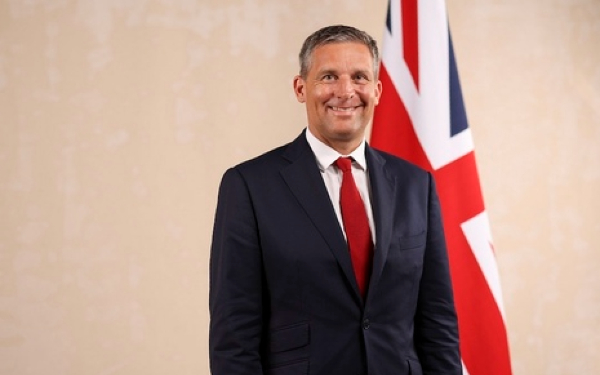
A minister has highlighted the role of prison-based social workers in helping female inmates maintain family relationships and supporting them with family court proceedings.
Prisons minister Lord (James) Timpson cited the pilot in response to a written parliamentary question from Liberal Democrat peer Lord Rennard, who had asked what proportion of female prisoners had children who had been taken into care as a result of their custody.
In response, Timpson said that that data had not been collected, though pointed to a recent Ministry of Justice (MoJ) analysis that found that 55% of women had a child under 18.
Social workers ‘supporting women to maintain family ties’
He added: “We are also piloting prison-based children’s social workers in women’s prisons that support women with family court proceedings, parental rights and maintaining or strengthening family ties.”
Under the prison-based social workers (PBSW) pilot, the MoJ has, since last year, been funding a practitioner to work in each of HMP Downview, HMP Send, HMP Eastwood Park, and HMP Bronzefield, with the project due to end in March 2025.
The ministry started funding the pilot four years after an MoJ-commissioned review into strengthening female offenders’ family and other relationships recommended that the government fund an on-site social worker in each of the 12 women’s prisons.
Benefits of prison-based social workers
The review, carried out by Conservative peer Lord (Michael) Farmer, said that prison-based social workers would:
- Provide a vital link with community social workers who have female prisoners’ children on their caseloads.
- Help promote uptake of places for women in mother and baby units (MBUs), the number of which had fallen in recent years.
- Act as advocates for women in prison, including in care proceedings, and help to broker more constructive relationships with community social workers to improve outcomes for children.
- Fulfil Care Act 2014 duties for women who need care and support.
Though the MoJ did not take up the recommendation in the aftermath of the Farmer review, the idea was then trialled by the charity Prison Advice and Care Trust (Pact), with funding from the Sylvia Adams Trust.
‘Incontrovertible evidence’ for prison social workers
Under the Together a Chance scheme, a social worker was placed in each of HMP Send and HMP Eastwood Park from 2021-23, and the pilot was evaluated by the children’s social care research and development centre (CASCADE) at Cardiff University.
The evaluation’s final report, published earlier this year, found that the pilot had “provided clear and incontrovertible evidence of the need for a qualified, prison-based social worker”. Other findings included that:
- The Pact social workers played a significant role in supporting women in managing mental health difficulties.
- All mothers were ‘very satisfied’ with the social worker service, and 91% reported feeling supported by professionals within the prison.
- For 88% of mothers who participated in the project, contact issues were resolved in the child’s best interests.
- The social workers’ specialist knowledge had benefitted prison staff by upskilling and educating them about the legal landscape around maternal relationships.
- The practitioners had demonstrated that they could were able to work for the benefit of the child and the mother.
- The pilot had demonstrated that mothers could, with the right support, continue to play a role in their children’s lives and be involved in decisions relating to their welfare, where this was in the best interests of the children.
- For those children where ongoing contact was not appropriate due to the nature of the mother’s offence, early data suggested that skilled support and being transparent with mothers was having a positive impact on wellbeing and contributing to the child’s identity through life story work.
‘Antagonistic’ relationships with community social workers
In launching the evaluation report, lead author Professor Alyson Rees said: “Mothers often have either an antagonistic or non-existent relationship with social workers in the community.
“Social workers in the community often do not know where mothers are imprisoned or how to contact them. By having a qualified social worker in the prison, this provided a point of contact who was able to support mothers, children, community social workers and help advise prison staff.”
In 2023, the MoJ took over the pilot, resulting in the PBSW scheme.
Following Labour’s election victory last month, Pact urged the incoming government to invest in social workers in every women’s prison, saying on X (formerly Twitter) that feedback from its pilot has shown that “a small investment can make a big difference in keeping women safe and families together”.


 Bournemouth, Christchurch and Poole
Bournemouth, Christchurch and Poole  Hampshire County Council
Hampshire County Council  Lincolnshire County Council
Lincolnshire County Council  Norfolk County Council
Norfolk County Council  Northamptonshire Children’s Trust
Northamptonshire Children’s Trust  South Gloucestershire Council
South Gloucestershire Council  Wiltshire Council
Wiltshire Council  Wokingham Borough Council
Wokingham Borough Council  Children and young people with SEND are ‘valued and prioritised’ in Wiltshire, find inspectors
Children and young people with SEND are ‘valued and prioritised’ in Wiltshire, find inspectors  How specialist refugee teams benefit young people and social workers
How specialist refugee teams benefit young people and social workers  Podcast: returning to social work after becoming a first-time parent
Podcast: returning to social work after becoming a first-time parent  Podcast: would you work for an inadequate-rated service?
Podcast: would you work for an inadequate-rated service?  Family help: one local authority’s experience of the model
Family help: one local authority’s experience of the model  Workforce Insights – showcasing a selection of the sector’s top recruiters
Workforce Insights – showcasing a selection of the sector’s top recruiters 

 Facebook
Facebook X
X LinkedIn
LinkedIn Instagram
Instagram
Would love to undertake this role